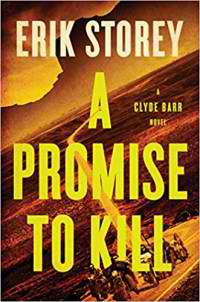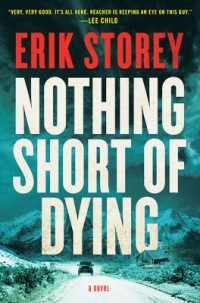A Promise to Kill by Erik Storey
 Wednesday, September 13, 2017 at 10:54AM
Wednesday, September 13, 2017 at 10:54AM 
Published by Scribner on August 15, 2017
Clyde Barr is a philosophical tough guy. His philosophical musings tend to revolve around what a harsh place the world is and how sad it is that he lives in a world that so often forces him to kill people. Barr tells us that he doesn’t “coexist well with people who like to hurt others,” yet he seems to seek those people out expressly so that he can hurt them. I guess the difference is that he doesn’t like hurting them, although that’s difficult to believe since hurting bad guys seems to be his mission.
In A Promise to Kill, the bad guys are bikers who are terrorizing a town on a reservation. The tribal cop won’t do anything about it so it’s up to Clyde. I’ve known a lot of reservation residents over the years, and they’re pretty good at looking after their own. The idea that heavily-armed residents of the rez would let a biker gang walk all over them and need to be rescued by a tough white guy strikes me as fanciful.
It also struck me as unlikely that biker gangs would ally themselves with Middle Eastern terrorists who are intent on attacking the United States and killing millions of people (presumably including bikers) with weapons the bikers are improbably able to hijack. I mean, bikers might rob a liquor store, although brawling is a more typical biker crime, but enabling a terrorist attack on their own country? Treason isn’t high on the list of crimes that biker gangs commit. But heck, people don’t like biker gangs and they don’t like terrorists, so team them up and we’ve got a thriller, right?
As in the first Barr novel, Barr finds himself rescuing women who have been taken hostage. Last time he rescued his sister. This time the bikers have taken a couple of local women, but that’s secondary to the terrorist plot that they are attempting to carry out. Naturally, Barr also has to rescue himself, but only after surviving some beatings to bolster his tough guy credentials with the reader.
Of course, the simplest thing to do would be to call Homeland Security or the Army after Barr discovers the threat, either of which would move massively to stop the terrorists, but nobody does that because … no cell reception? Ah, drive an hour dudes, it really isn’t hard to make a telephone call, even in Utah. The locals are stymied by a couple of bikers who set up road blocks? Seriously? Barr’s plan takes a lot longer to execute than it would have taken to bypass the bikers and call the cops. But if anyone had done that, Barr wouldn’t get to play hero and we wouldn’t have a thriller.
Barr is the prototypical tough guy, a man of few words but many thoughts, always about himself, typically about the many tough guy battles he’s fought. When he does say something, it’s usually a tough guy cliché (“failure is not an option”). He grunts and sighs quite a bit (tough guy language), but he can ride a horse and drive a semi and take guns apart, so his tough guy credentials are clear.
He’s also good at fighting, as he tells us during a number of lengthy fight scenes, a skill he regrets having to use so often despite devoting his life to putting himself in situations that require him to fight. About a dozen times, Barr is ready to surrender to fatigue, but he sees something or thinks about something that motivates him to keep fighting. When a character draws on inner strength once or twice, it’s fine. When a character reaches deep on every other page, the writer is clearly running out of ideas.
I’ve enjoyed many tough guy novels over the years, but as Erik Storey proved in the first Barr novel, Barr just isn’t a very interesting tough guy. Nor is A Promise to Kill a very interesting book. The prose flows smoothly and the story moves quickly, but the plot isn’t particularly innovative or believable and Barr has no substance beneath his tough guy persona.
NOT RECOMMENDED
